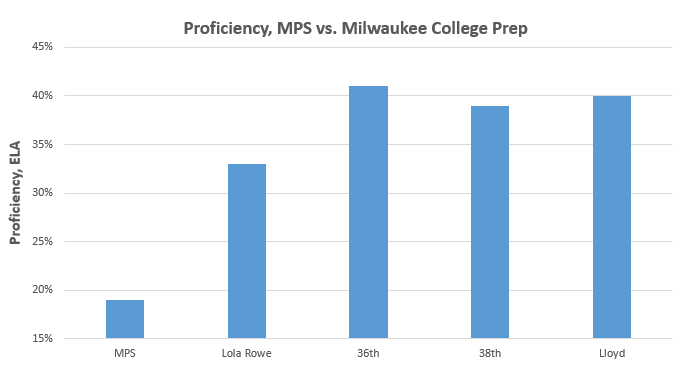Will Flanders, Ph.D.
Recently, Milwaukee College Prep (MCP) charter schools and Milwaukee Public Schools (MPS) failed to make an agreement for continued authorization. This ends a ten year relationship between MCP and MPS, and once again highlights the horrific environment for public charters in the city of Milwaukee due largely to the power of teachers unions.
The four MCP schools that are authorized by MPS are some of the highest-performing in the city. The table below shows proficiency in English/Language Arts between MPS and each of the schools on the most recent round of the Forward Exam. MPS proficiency overall remains woeful. Less than 20% of students districtwide were found to be proficient on the exam. In contrast, proficiency rates in MCP charters are far higher–more than double the MPS proficiency rates in all but one case.

This is consistent with our Apples to Apples studies, which have regularly shown charter schools to be among the highest performing schools. Consequently, losing these schools will not only cost MPS financially (according to reports they will lose about $2 million), but also on their Forward Exam scores. If performance is similar to the data presented here in the future, MPS would lose nearly 1% proficiency thanks to the loss of these schools. So why would MPS allow this to happen?
While we can’t know what has gone on behind the scenes, it has been clear publicly for a long time that MPS has fostered an unfriendly environment for public charter schools. Consistent with the national turn of the left against public charter schools in recent years, the district has shown a pattern of supporting the desires of teachers’ unions to preserve the status quo rather than working to do what is best for it’s kids. In 2019, the MPS Board used a discussion on whether to reauthorize another high-performing charterer (Carmen) to insult and impugn charter schools, with MPS Director Larry Miller referring to charters without any evidence as “the new segregation.” In December 2020, MPS changed their standard operating procedure by offering several high-performing charters a renewal of only three years instead of the five years that has been offered in the past. Moreover, the district continues to skim exorbitant administrative fees from many charters in the amount of more than $2,000 per kid that makes it more difficult for schools to meet the needs of their students.
We are not that far removed from a time when charter schools were viewed positively by both the left and the right. As recently as the Obama Administration, grant programs were created to fund chartering across the country. These schools were seen as a public school alternative to the status quo of traditional schools. But now in the minds of many on the MPS School Board, public charters represent an insidious effort to provide competition to the union members they rely on for their positions.
In time, as proficiency rates sink even lower and more and more families leave MPS for higher performing competition, the district may come to regret the poisoned environment they have created for charters. But so long as the Board members who have fostered this reality continue to be rewarded at the ballot box, we won’t hold our breath.